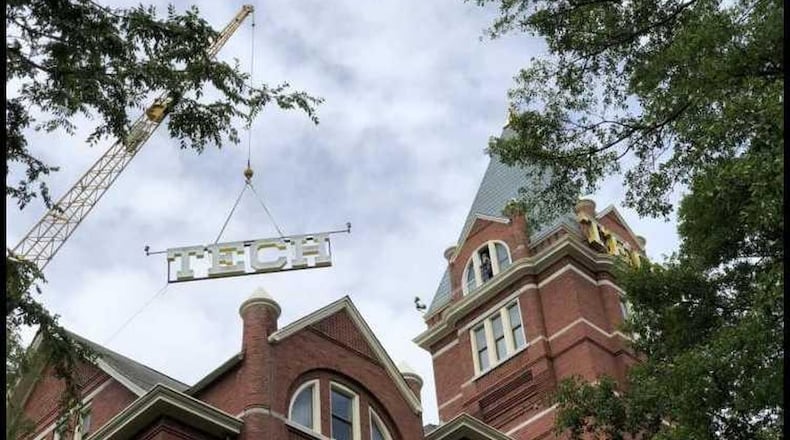An employed couple at Georgia Tech violated the school’s nepotism policy, and concerns from colleagues that the wife assisted her husband in getting involved in a project went “mostly uninvestigated” for about a year, says a report released Wednesday by state officials.
Five employees from Georgia Tech Research Institute’s Information and Communications Laboratory complained about the relationship to the institute’s ethics director in September 2017, but it was not fully investigated until one year and a day later, by the University System of Georgia.
“The substantive components of the concerns identified went mainly uninvestigated for a lengthy period of time,” University System of Georgia Vice Chancellor John Fuchko wrote in his report, dated Monday, to Georgia Tech President G.P. “Bud” Peterson.
VIDEO: Previous Georgia Tech coverage
The report also found institute officials ignored advice from Georgia Tech’s legal affairs office that a “management plan” between the husband and wife to address nepotism policy concerns was not in compliance with state rules.
The wife, Jill Gostin, the deputy lab director when the investigation began, has been told she will be removed from administrative duties, officials said Wednesday. Her husband, Bill Marshall, retired earlier this year. Several other employees were reassigned or had their supervisory authority revoked, the report said.
Gostin has been lauded for her work. In 2016, she was named Tech’s woman of the year in technology in the medium business category. Efforts to contact the couple were unsuccessful. The couple, the whistleblowers and others involved knew of the report’s findings before it was released, officials said.
The report is the latest of several revelations in recent months at Georgia Tech which exposed employee conflicts-of-interest that have resulted in some top administrators being fired or resigning. Peterson has repeatedly called the findings “embarrassing” for Georgia Tech, which is often ranked among the nation’s top research institutions. Peterson is scheduled to send the University System an update next week on how it is improving its ethics culture.
The report also exposes how long it often takes Georgia Tech to complete investigations into internal ethics complaints. The Atlanta Journal-Constitution reported in September that Georgia Tech took an average of 102 days last year to investigate complaints, the second-longest time of any college or university in the University System, according to a state Board of Regents report.
In this case, officials said part of the delay stemmed from a communication gap between institute officials investigating different aspects of the complaint.
“The miscommunication and siloed processes between the GT units played a significant role in the extension of this investigation. Ultimately, the passage of time combined with the failure to address the underlying issues as originally raised escalated conflict within (the lab),” the report said.
The report said Gostin had a supervisory role in FalconView, a mapping system the institute created for the U.S. Department of Defense. Her husband wasn’t part of a FalconView project, and the two had email discussions in July 2017, sometimes with others, about how he could get involved. One worker declined to include Marshall, and the worker said he was removed from the project. Marshall was included in it at the end of the month.
The couple married in early 2017, University System officials said. The report did not say and officials couldn’t recall when they started working together.
Georgia Tech has been innudated with ethics complaints in the last four months, 140 of them, Peterson said Tuesday.
The University System has taken the lead role in some longstanding investigations, such as this one. Investigators said Wednesday they’re now focusing on employee claims of financial waste in this case.
University System and Georgia Tech officials now meet weekly to review complaints. University System spokesman Lance Wallace said Wednesday the extra help and demand by Peterson and others has sped up some investigations. The average time to close a case since July is now 53 days.
“It’s going to take some time to address these concerns, but it is happening,” Wallace said.
About the Author
Keep Reading
The Latest
Featured



